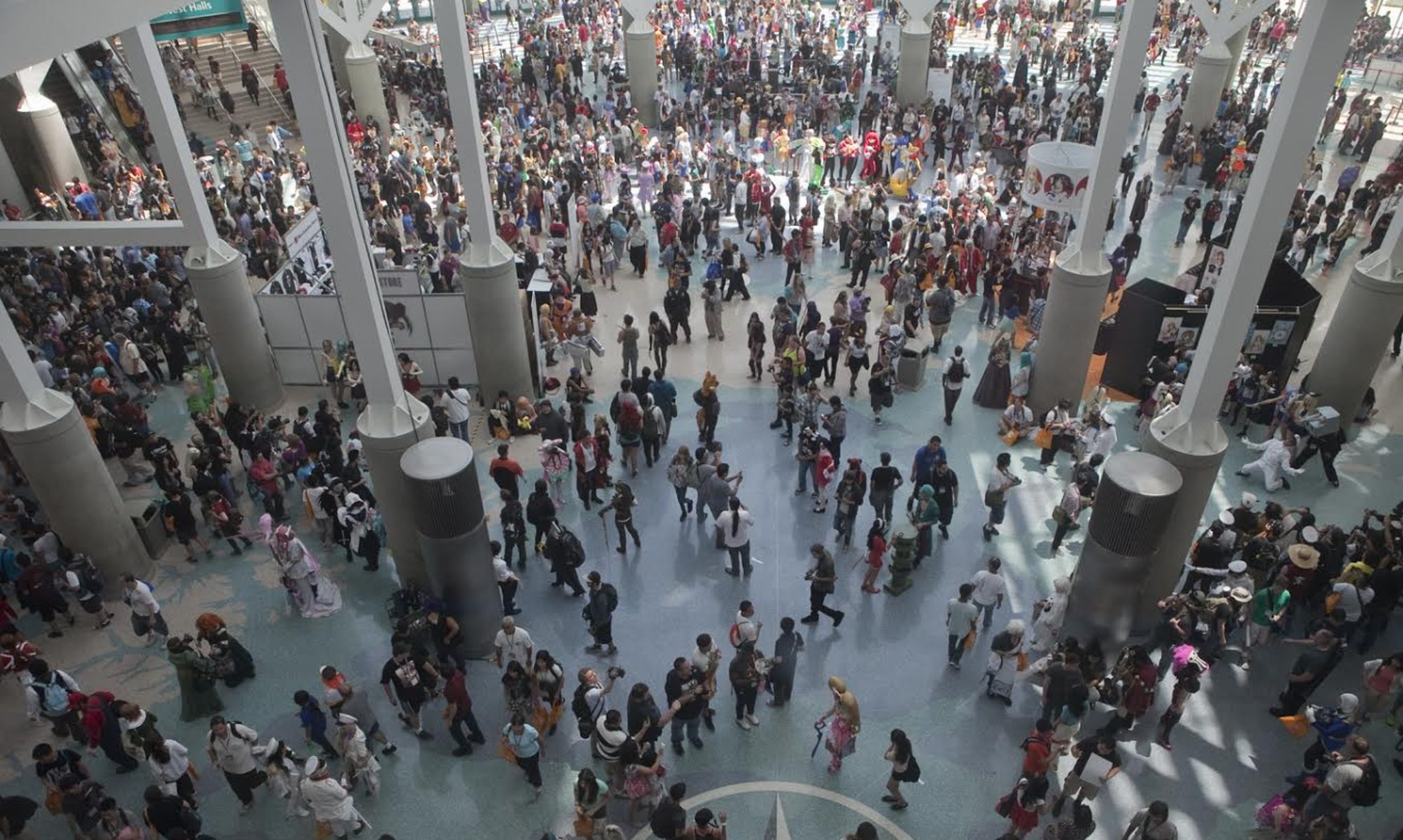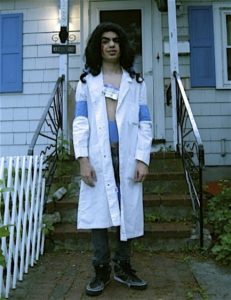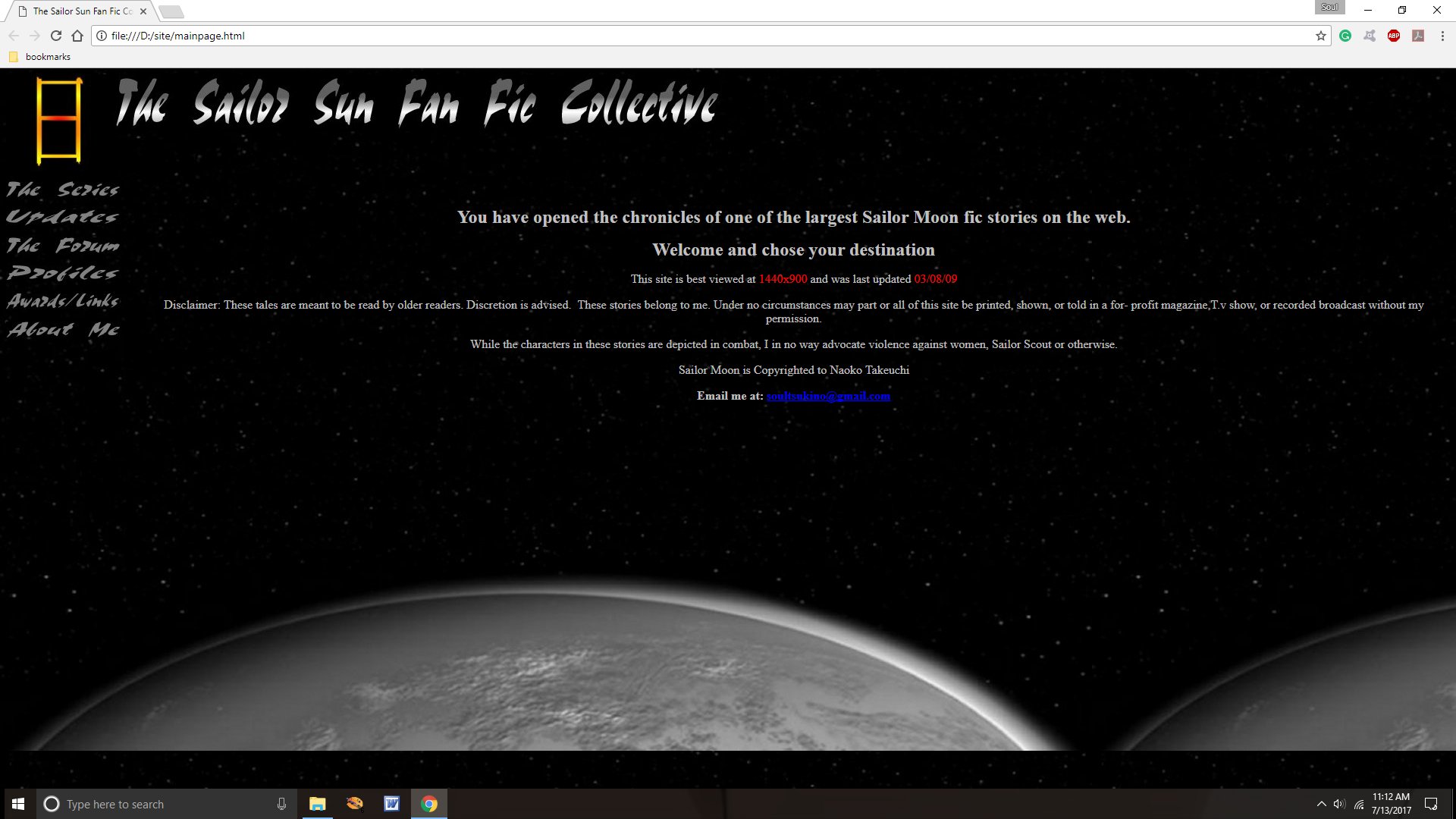Age: 32
Location: Rhode Island
When did you discover anime? Share as much as you remember. I first discovered anime when I was eight years old. I was visiting family, and my uncle knew that I loved Robotech, Transformers, and shows that that “futuristic” vibe. He invited me to check out a new cartoon. It was on VHS, the video was grainy and warped – like it had been transferred to other tapes a bunch of times, but I was intrigued.
I sat, entranced, as the C6250’s whistle blared through the TV’s mono speakers, as the wheels began to turn and the camera shifted to a view of train tracks stretching into an endless blackness.
Then the logo appeared: “Galaxy Express 999.”
Honestly, at the time, I had no clue as to what I was getting into. And, really, who would? I was freakin’ eight! The cast didn’t speak English, might as well have been moon speak for my mind at the time. Then the subtitles popped up: they were hasty, rife with misspellings, and flashed by so fast. But I got a few words, and I could get the gist.
That said, it wasn’t the words that mattered. The characters said mountains through their visual language and their tone. Maetel’s distinct knowing sadness, Tetsuro’s desperation to leave everything behind… it spoke volumes.
It became sort of our monthly thing. I’d visit, and we’d watch more Galaxy Express 999. By the time we finished, I was hooked. I had been to a few anime club meetings, and I just wanted more, and more, and more.
By the time I turned twelve, I was ready to begin buying my own anime. I actually picked up my first tape—which contained two whole episodes of Ranma 1/2—at the flea market in Taunton, MA.
What appealed to you about anime when you first discovered it? Honestly, it’s hard to really state what it was. There was just so much that was different from the norm. The visual language, the characters, the general setup were so unique, so different from other cartoons. They didn’t talk down to you, and they expected that you’d be able to understand concepts that just did not exist in western cartoons. People died and mourned, people didn’t always find that happy ending, and sometimes, the best path of action was that which would bring real pain.
Yes, there were silly shows like Dirty Pair, but it just felt like there was so much more to the world, so many places to explore and discover.
What would you say was the most popular anime at the time? I can’t say for certain, as this is going back about twenty-four years now. But, at the clubs, we’d watch a lot of titles like Dirty Pair, Patlabor, and Devil Hunter Yohko. The last meeting I went to was in 1994-ish – I was about ten, and the group was in the middle of Sailor Moon R and Ghost Sweeper Mikami.
What was it like to be a part of anime fandom at the time? Dear lord, where do I start? I was in a bit of a weird spot, being a kid who was jumped in. But that never really seemed to matter. It was always a welcoming community‚we’d watch, we’d talk—and yeah, they’d tell me to “shut the fuck up” when I started saying something stupid, but they still let me, an eight-year-old kid, weigh in on things with an equal voice. It was just a welcoming, super supportive group of geeks and social misfits, who were united in the search for awesome anime.
Wait, this was with your uncle and his anime club? Tell me more about this dynamic. That it was! Basically, my uncle was an… “interesting” person. He introduced my brother to Star Wars, and me to anime. Not long after we started watching Galaxy Express 999 together, he decided it was a good idea to introduce me to his club. It was, well, a group of adults, all guys in their 20s and 30s, and they gathered at one of the members’ homes. A couple of people had tapes—sometimes they were taped off of TV (like Voltron, Star Blazers, and Saber Rider and the Star Sheriffs). Others, they were whatever could be rented from CJ’s Video (a little mom ‘n’ pop shop in Bristol, RI – now defunct). Other times, though, one of the tape-bringers had a treat. “Newest shit, straight from Japan!” In 1992, this meant that we were watching titles like Sailor Moon, Yu Yu Hakusho, and Tekkaman Blade. Mind-blowing stuff. Kind of hard to comprehend when you’re eight years old and there’s no subtitles, though. (heh)
Now, after watching the day’s episodes, the group would sit around, and basically bullshit about the shows they’d watch. I wish I could tell you what about, exactly, but we’re going back 25 years now. I remember that they basically did go talk about what they really dug about the episodes, and what didn’t work. We’d talk about favorite characters and how shows stacked up to other titles that we saw at the time.
And, well, as someone who was part of the club, I was given a pretty equal voice. If I liked watching Sailor Mars kick butt, then I could say it. If I thought that Cyber Formula GPX felt like Speed Racer, I could bring it up. At the same time if I was saying something stupid that wasted valuable meeting time, they’d be quick to call it out like anybody else—with a quick “shut the fuck up, Mike.”
It was a strangely liberating experience for someone who grew up in a pretty strict household—to be treated as an equal among people far older than I was, and to actually be able to discuss something I genuinely adored without being blown off as “just a kid going through a phase.” Nowadays, I wonder if they were humoring me, but if they were, I still appreciate it greatly.
Also, what did your parents and siblings think about your interest in anime? At the time, my brother really didn’t give a rat’s butt. He was 10, and he was just starting to find his own passion in music—particularly the drums. And, for many years, it stayed that way. He’d be the charismatic musician, I’d be the gawky anime and gamer geek. It wasn’t until about 2005? when he asked for a few examples of anime for a college course he was taking. I loaded him up with the essentials for newcomers—Akira, Cowboy Bebop, Afro Samurai, and so on. And, while it didn’t ignite a passion in him, he did come out to say, “I get it. I see why you like this so much—and I’m behind ya, 100%.”
My parents, on the other hand… they weren’t too thrilled.
My uncle was my dad’s brother. The two really didn’t have a good relationship to begin with. In one of my father’s anecdotes from his childhood, he tied my uncle up to a tree with a leash and left a bowl of food and water like a dog. He called my uncle “Tree Boy.” No word of a lie.
But anyway. He saw the whole fascination in anime as a bit creepy, because, to quote him: “My loser brother watches that queer shit and he amounted to nothing.” He tried to dissuade me whenever he could.
My mom, on the other hand, thought it was a phase—something I’d grow out of, and just outright abandon by the time I hit puberty.
Yeaaaaah, about that. Didn’t happen. In high school, I and a few other classmates started our own little tape trade—we’d make copies of shows we had, and trade them among ourselves.
Does your uncle still watch anime? What does he think of your work in the fandom? Sadly, I haven’t talked to my uncle since my grandfather passed away in 2002. Don’t even know where he lives anymore.
Was the Internet a part of fandom at the time? The internet as we know it didn’t exist! We had clubs—gatherings of like-minded fans, where we’d watch shows on VHS that were brought in by a lead member. The tapes were grainy, often fifth or sixth generation copies, but they were our lifeline as fans of a medium that was pretty much underground.
Do you remember your first convention? I do! Mikkakan in 2001 was held at Merrimack, New Hampshire’s Radisson Hotel. This was the definition of a tiny convention. Only 33 people attended the event, including guests and staff. Still, it was an eye-opening experience—to walk the halls of the Radisson, and see people milling about, talking about shows like One Piece or Hellsing like it was nothing.
That said, I think Neil Nadelman’s panel at the event was something truly transformational. Sure, it was just a talk about localization. But, for some reason, his passion and adoration for the medium spoke to me. It told me that I wanted to be involved in this industry for as long as I could manage.
Sixteen years later, and I’m still at it, writing away night after night. 🙂
When and why did you start Anime Herald? I started Anime Herald on September 19, 2010. I originally launched the Herald because, well, [the place I wrote for before,] Anime Dream was starting to slow down. Matt (Brown—former Anime Dream Editor-in-Chief) was losing steam, and I was still churning out content on a near-daily basis. I saw the writing on the wall, but I didn’t want to stop writing about anime. So, I broke off.
Anime Herald actually began as a bit of an amorphous blob—anything that came through, I’d try it—and believe me. Some of the earlier content got weird at times, while I was trying to figure out what would stick. But, anyway! It slowly took shape—first as a repository of personal essays, editorials, and reviews.
Eventually, things started to solidify as I found formats that worked. I started learning which article formats that would pull in readers, and which were just becoming dead air. And, eventually, it just kind of took shape to the format you see today. Met some amazing people along the way, many of whom I’m proud to call my friends, and it’s just been a crazy seven-year ride.
How has being an anime reporter changed the way you watch anime? How has it changed the way you interact in the fandom? Honestly, becoming an anime reporter was both the best and worst thing that could happen as a fan. I say this jokingly, of course, but there’s a nugget of truth beneath the humor.
I started my formal anime career (not counting the little fan sites I ran in 2000-2001) at Anime Dream, as a reviewer. At the time, I had a pair of fantastic mentors: Matt, and and editor that I only knew as “Elfshadow.” They both taught me a lot about how to approach a show from a more critical lens—to spot elements like mise-en-scene and color usage to sell a mood. They taught me about narrative and dialogue tropes, as well as things like “bank shots” (shots used repeatedly through the course of a show to save money on animation) and sakuga (sequences of noticeably higher quality, used to highlight a particularly important scenes).
Matt and Elf also taught me how to tell when those seams that hold a show together were starting to slowly unravel. After reviewing shows about four or five years, you start to just take on that mindset—that analytical bent, where you’re slowly tearing down a show or film, silently noting what works and what doesn’t while you form your opinions.
Right now, I live my life in the news feeds. I pop open J-Blogs like Otakomu and Comic Natalie while I’m drinking my morning coffee, and I cruise through sites like Animate Times, Crunchyroll, and Anime News Network from the time I get home from work, to the time I go to bed at night. I’ve been doing the beat for 6-ish hours a day, seven days a week, 360-ish days a year since 2008.
And, really, that adds another layer to your approach to anime—I’ve found that, more often than not, I’m dissecting not just the nuts and bolts, but the people who make the shows. Suddenly, I’m thinking about who made the show, which studio put it out, and so on and so forth. So it’s started to factor in that calculus as I watch.
Honestly, as for interactions? I’ve always been a private person by nature. This isn’t on purpose; I’m just a bit of an introvert. Working as an anime reporter, managing our social media accounts and the like, has really allowed me to open up a bit. I’m still an awkward, gawky tech geek, but I’m someone who can talk more openly, and who can throw down in a good conversation.
Heck—if not for Anime Herald, I don’t think I’d have the guts to even attempt—let alone host a panel at Anime Boston each year. It’s been a great way to kind of lean into the challenges of talking with people.
Since you discovered anime, how do you think you’ve grown as an anime fan? Oh wow… I don’t even know how to answer this one! For about as long as I can remember, I’ve been an anime fan. So, I mean… it’s very much a part of who I am, and what I do.
As a fan, though, I think being jumped in that early, being able to see that little slice of a community at an early age, is something that stuck with me. Though I stopped going to the club meetings, it was a super special time in my life. I was able to see amazing things, and experience incredible shows with people who were genuinely passionate about anime. If I hadn’t met them, I probably wouldn’t be watching anime today.
And, to be honest, I always wanted to bring that feeling of camaraderie and community to the world, somehow. Still not sure how to really do that.
That said, it’s inspired me to really take an interest in helping new fans, spreading the good word, and to generally helping to make this fandom a better place whenever possible.
Samantha can be reached on Twitter and her blog.


